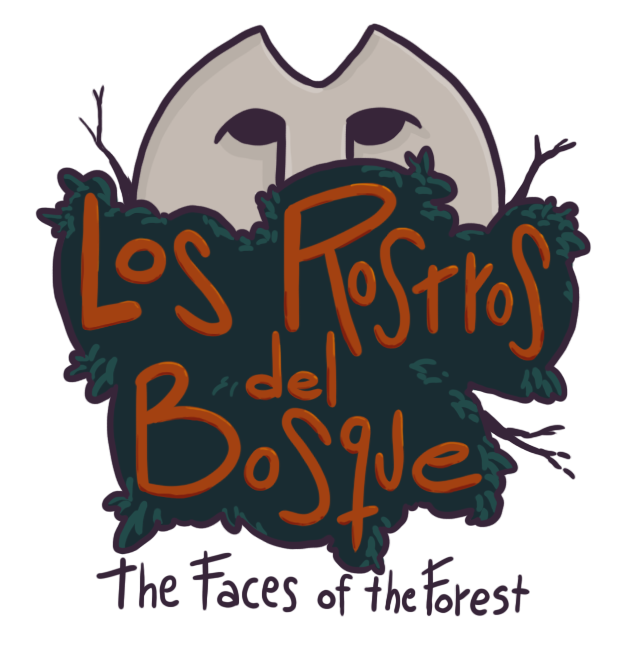Traducción al mapuche / Mapuche translation
Este juego está fuertemente inspirado en la cultura originaria mapuche, desde su estética hasta los temas que trata, y pasando por los nombres de casi todos sus personajes.
La mayoría de estas influencias fueron decisiones iniciales de Mer Grazzini (nuestra ilustradora y animadora estrella), pero eventualmente se esparcieron por todo el juego y llegaron a definir su identidad como obra.
En sus 2 años de vida, Los rostros del bosque recibió traducciones sorpresa de traductores voluntaries que nos regalaron horas de su trabajo para expandir el alcance de este juego a audiencias que originalmente ni habíamos anticipado.
No podemos explicar lo agradecides que estamos con Gustavo Pires de Carvalho (portugués brasileño), Jessica Amoruso (italiano) y todo el equipo de traducción al francés (Adèle Couaillet, Eliott Jeze, Adèle Koulytchizky, Victorien Lechevallier, Pierre Meyer y todes les demás participantes y organizadores de la LocJam).
Sin embargo, nos quedaba la deuda pendiente de traducirlo al idioma originario de la cultura en la que nos habíamos inspirado para crearlo.
Hoy saldamos esa deuda. A partir de esta nueva actualización, todos los diálogos del juego se pueden leer en mapuzugún (también llamado mapudungún, araucano, o simplemente idioma mapuche).
Fue sorprendentemente difícil encontrar a alguien que
- hablara el idioma,
- tuviera un manejo básico de PC como para editar archivos de texto, y
- tuviera la disponibilidad para pasarnos un presupuesto por la traducción,
pero creo que el esfuerzo valió la pena. El trabajo lo terminó realizando Héctor Painén Huenufil, también llamado el Cantor Mapuche, también llamado Renken Kurvwentru, quien además tiene por supuesto nuestra inmensa gratitud. Su esfuerzo y su inventiva a la hora de combinar palabras establecidas para inventar términos que en Mapuzugún no existen, como “clic” o “créditos”, me impresionaron a cada paso.
Es posible que Los rostros del bosque sea el primer videojuego traducido al mapuzugún, o al menos el primero sin fines explícitamente educativos. No soy periodista, así que no es mi trabajo chequearlo. La traducción actual no es necesariamente perfecta y estamos abiertes a sugerencias de cambios, pero así tienden a ser las cosas en proyectos tan pequeños.
El juego sigue siendo gratuito, así que lo único que podemos pedirles (como siempre) es jugarlo, compartirlo y recomendarlo. Nuestro trabajo como Cuatro Assets, y más recientemente como parte de la cooperativa Matajuegos, nos llena de orgullo y soñamos con difundirlo lo más lejos posible.
English
This game is strongly inspired in the aboriginal Mapuche culture, from its visuals to its themes and even most of its characters’ names.
Most of these influences were initially decided by Mer Grazzini (our star artist and animator), but they eventually spread to the entire game and then came to define its identity as a work of art.
In its 2 years of life, The Faces of the Forest received surprise translations by voluntary translators who gifted us hours of their work to expand the game’s reach to audiences we originally hadn’t even anticipated.
We can’t explain how grateful we are to Gustavo Pires de Carvalho (Brazilian Portuguese), Jessica Amoruso (Italian) and the whole French translation team (Adèle Couaillet, Eliott Jeze, Adèle Koulytchizky, Victorien Lechevallier, Pierre Meyer and all other LocJam participants and organizers).
However, we still owed the game a translation to the original language of the culture we were inspired by.
Today we pay that debt. From this update on, all dialogue in the game can be read in Mapuzugun (also called Mapudungun, Araucano, or simply Mapuche language).
It was surprisingly difficult to find someone who
- spoke the language,
- had the basic computer knowledge to edit text files, and
- had the availability to come up with a budget for the translation,
but I think it was worth the effort. The job was finally done by Héctor Painén Huenufil, also called Cantor Mapuche, also called Renken Kurvwentru, who of course has our immense gratitude as well. His effort and inventiveness in combining established words to make up terms that don’t exist in Mapuzugun, like “click” or “credits”, impressed me at every step.
It’s possible The Faces of the Forest is the first videogame that’s been translated into Mapuzugun, or at least the first non explicitly educational one. I’m not a journalist, so it’s not my job to fact-check it. The current translation is not necessarily perfect and we’re open to suggested changes, but that’s how things usually are in such small projects.
The game continues to be free, so the only thing we can ask of you (as always) is to play it, share it, and recommend it. Our work as Cuatro Assets, and more recently as part of the Matajuegos co-op, fills us with pride, and we dream of spreading it as far and wide as possible.
Files
Get Los rostros del bosque
Los rostros del bosque
A metroidvania where you draw animals to gain their abilities, set in a Latin American town
| Status | Released |
| Authors | Cuatro Assets, FedeCardi, David T. Marchand, Mer Grazzini, Auntie Jess |
| Genre | Platformer |
| Tags | Animals, argentina, Female Protagonist, latino, Magical Realism, Metroidvania, Pixel Art, sourcecode, tango |
| Languages | English, Spanish; Castilian, Spanish; Latin America, French, Italian, Portuguese (Brazil) |
| Accessibility | Subtitles |

Leave a comment
Log in with itch.io to leave a comment.